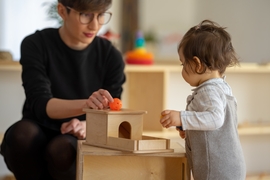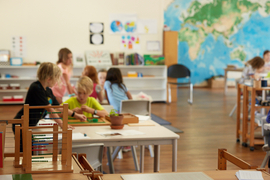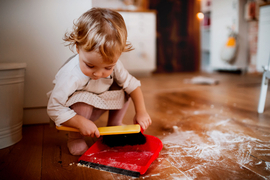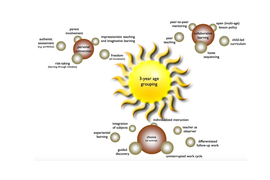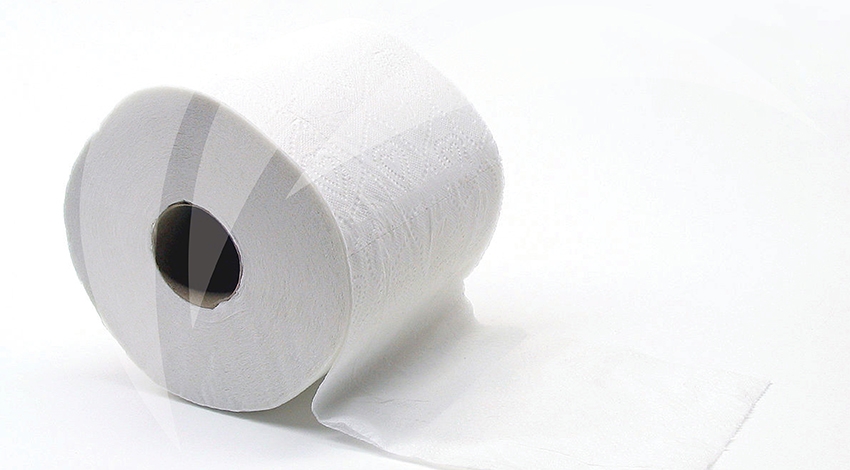
Parenting is one of the most rewarding and challenging roles we play as adults. Our society has high expectations of parents and yet we are not always able to access the resources we need to become the parent we want to be. Montessori can offer you a parenting framework from birth to maturity. It is more than an educational method; it is an approach to supporting the full development of your child.
The following are some simple, yet effective ways in which adults can support the development of a young baby.
Toilet training?
Its not just toilet training. Learning to use the toilet is:
- a great opportunity for your child to be independent
- a natural and positive progression for your child
There are 3 stages to toileting awareness:
- Your child is aware that he has just toileted.
- Your child is aware that he is toileting right now.
- Your child is aware that he is about to toilet.
Your child’s awareness of these stages will build at his own unique pace. These stages cannot be rushed, however the more time your baby has out of nappies, the more aware he will be of each stage.
From the start...
- Allow your baby as much time without a nappy as possible. This gives him freedom of movement and allows him to see and feel what is coming out of his body.
- We recommend the use of cloth nappies. They mean a little extra work for you, but they allow your baby to experience immediate feedback when he urinates, i.e. he will feel wet!
- Change your baby’s nappy as soon as it is wet or soiled, so that he begins to understand that it is most desirable to be dry and clean.
- Once your baby can sit, encourage him to sit on a potty before changing his nappy and before a bath.
- When caring for your baby, allow him to participate in the process by telling him what you are doing. When he is ready, allow him to push his legs through pants and his arms through sleeves
- Wipe your baby’s hands with a wet cloth after nappy changes. As soon as he can reach, put a stool under a sink and teach him to wash his hands there. Getting into a routine of handwashing after toileting is very important.
- Allow your child to watch you on the toilet. He will learn a lot from this.
- From a safety perspective, always be present when your child is in a bathroom.
Be prepared
In order to prepare you home for your baby, we recommend that you:
- Buy simple underwear for your child.
- Buy a potty and put it in the bathroom.
- Have a bucket into which used underwear can go before being washed.
- Prepare a cleaning bucket together with cleaning cloths for when your child toilets on the floor.
- Have spare underwear and clothes ready so that your child can change immediately and then continue with his day.
- Be emotionally prepared, your attitude can either help or hinder your child. Be positive, tolerant and understanding.
- The more pressure you apply on your child the longer this process will take.
When your child is wearing underwear
- Build routines that encourage your child to sit on the potty often. Don’t ask, just say ‘It’s time for you to sit on the potty’.
- When you go out, be prepared with spare clothes, a bag in which to put wet or soiled clothing and some cloths for cleaning up. Being organised will help to keep the situation calm.
- When your child wets or soils his underwear, help him to clean up and encourage him to sit on the potty, to see if there is any more. This helps him start to associate toileting with the potty.
- When your child is ready to move from the potty to the toilet, find a wide secure stool so that he can step up and turn around on the stool, in order to sit on the toilet. It’s hard for most children to climb up backwards to sit on a toilet.
Our Expert Tips
Be consistent: The more consistent you are, the quicker a child will understand what is meant to happen. If mixed messages are given, by trusting him to use the potty one day, but then putting him in nappies the next, it will take longer for him to learn how to use the toilet independently.
Be positive: Try not to use negative language or to refer to an ‘accident’. Bodily functions are natural and learning control over them takes time. Children will learn to use the toilet. It just takes time and patience for them to learn how, when and where.
